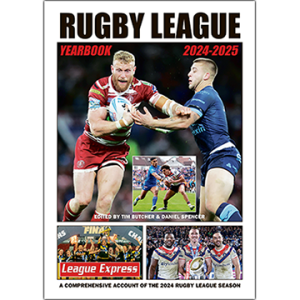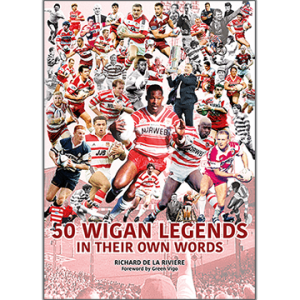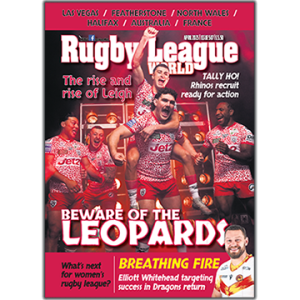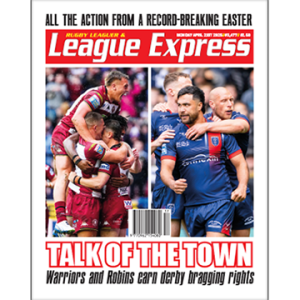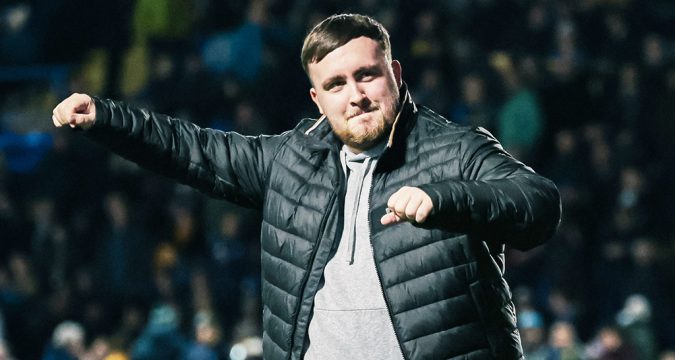
JAMES GORDON pays tribute to Warrington Wolves for their imaginative renaming of their stadium for one night, while reserving his criticism for those who failed to communicate the reasons for the Salford debacle in the opening week of the season.
If you’d said at the advent of Super League that one of its clubs would rename their stadium in honour of a darts player, most people would have said you were mad.
But that was the reality at The Luke Littler Stadium on Friday night, as Warrington paid tribute to their hometown hero, the darts champion of the world.
They were right to do so too. Littler has transcended the darts world in a way that no other sports star has done for any sport in recent times, and he is someone that the town, and the club he supports, is rightly proud of.
Littler paraded his world trophy in front of the south stand where he normally watches games from as a fan, and he continues to be a regular at the Halliwell Jones Stadium despite the hectic schedule and travelling demands of being a top darts player, particularly with the almost unprecedented interest and attention for him commercially and from the media.
Ahead of the game, Warrington had done some work to update signage around the ground, with Luke Littler appearing above a crossed out Halliwell Jones sign at the stadium entrance. Pre-game, Littler was interviewed on the pitch by Sky Sports and then came out before the players to lift his world trophy, before then welcoming the two teams on the pitch.
Elvis was even in the building to contribute to a big match build-up, that unfortunately the on-field action struggled to live up to, at least in the first half. Things livened up after the break, with Littler captured celebrating a fine Danny Walker try, backing up a George Williams break to give Warrington a lead that they wouldn’t relinquish.
Warrington do try to move the needle with their marketing efforts. Some may call them gimmicky, but Karl Fitzpatrick is always keen to challenge his team to push the boundaries and find ways of getting them coverage. The stadium name change, they say, got existing sponsors Halliwell Jones two or three years’ worth of exposure within 48 hours, which can only be a good thing when the Wolves come to discuss a renewal with their long-term stadium title partners.
The column inches captured even by just associating with Littler is something that otherwise, Rugby League can only dream of.
As Martin Offiah remarked to me a couple of years ago in an interview, he is more than 20 years retired and yet he is still wheeled out when there’s any whiff of a Rugby League connection required for a PR opportunity. He is, of course, a legend of the game, but it means that in the past two decades, there hasn’t been anyone recognisable beyond the inner sanctum of the game.
There has almost been a sense of desperation from Rugby League every time someone perceived to be famous shows any inkling of a connection to the sport. Mason Mount was part of an excellent sponsorship activation between Manchester United and Wigan Warriors, courtesy of Betfred recently, so naturally when he rocked up at Wigan’s round one game the Sky Sports cameras couldn’t help but find him in the crowd on a regular basis.
We’ve seen it in the past with other football personalities like Roy Keane and Stuart Pearce, while Olympians Bradley Wiggins and the Brownlee brothers have been used as part of Super League promotions.
The question remains – why aren’t Rugby League’s own players enough to market the game?
That is the challenge facing the game, and RL Commercial appear to acknowledge that. Currently recruiting for a ‘Head of Communications’, one of the requirements of the role is “to oversee Star player and Influencer strategies to raise the profile of the sport and drive growth; audience and revenue.” with desirable experience “in celebrity or talent PR to grow Individuals (sic) profiles.”
Comparisons with Rugby League’s golden age are perhaps futile, given the landscape of sport and the media is much different. Even the England rugby union and cricket teams are relatively anonymous to much of the public, whereas decades ago, they would have been household names, and that’s even with their much more significant resources and coverage.
There’s an argument that saturation has caused that, as well as disappearing behind the satellite television paywall, although that hasn’t prevented Luke Littler from bursting on to the national conscience.
Perhaps he is just an exception to the rule, a phenomenon, a unique story, character and achievement that would be almost impossible to replicate in Rugby League or any other sport.
What a Head of Communications might also help with is dealing with some of the problems Rugby League seems to be creating for itself. Whatever side of the fence you sit on with regards to the Salford debacle in round one, the bottom line is that the key stakeholders of the game – the fans – were not kept up to date with the truth of what was going on. We don’t expect continual statements, but there are questions that still remain unanswered, there was endless debate and accusations over who was to blame, and a proper strategy to communicate transparently could have prevented a lot of the negativity that built up around that situation.
There is the train of thought that actually, having such a big talking point wasn’t a bad thing. However, that’s negated by the fact one of Super League’s few live terrestrial televised games on BBC was marred and basically a non-event as a result. You can’t bend rules just because you’ve got a broadcast opportunity; the integrity of the sport must come first; but someone should have explained better what was going on.
Accusations that the RFL’s actions had somehow impacted the integrity of the competition by giving St Helens an easier game were met by a wry smile. This is a competition where the champion is decided by a play-off series, after 27 rounds of irregular fixtures where some teams play each other three times and others don’t; and the make-up of the competition the following season is decided by a glorified spreadsheet formula of points!
People seem to have been more irate about the Salford situation than they were last year when London Broncos were effectively told not to bother pre-season, and Hull threw away half the year to rebuild knowing that they would be guaranteed their place regardless.
However, the RFL (or RL Commercial or Super League or whoever it is deemed to be responsible) could have managed the communication around the Salford situation better to avoid the criticism they received. I’ve long since thought that the RFL should be more pro-active in correcting inaccuracies as they take a lot of flak, sometimes unfounded, and the only way they’re going to turn that around is by tackling it head on.
Finding a way of putting Rugby League players on the sort of pedestal that they used to have, and get even a tiny part of the exposure (and money!) that someone like Luke Littler receives, is an altogether much more difficult challenge.

